Bedford Square
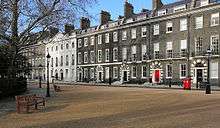
Bedford Square is a garden square in the Bloomsbury district of the Borough of Camden in London, England.
History

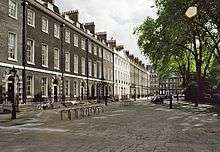
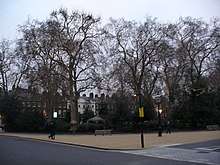
Built between 1775 and 1783 as an upper middle class residential area, the square has had many distinguished residents, including Lord Eldon, one of Britain's longest serving and most celebrated Lord Chancellors, who lived in the largest house in the square for many years.[1] The square takes its name from the main title of the Russell family, the Dukes of Bedford, who owned much of the land in what is now Bloomsbury.[2]
Bedford Square is one of the best preserved set pieces of Georgian architecture in London, but most of the houses have now been converted into offices. Numbers 1-10, 11, 12–27, 28–38 and 40–54 are grade I listed buildings. The central garden remains private. Bedford College, the first place for female higher education in Britain, was formerly located in (and named after) Bedford Square. The square is Grade II* listed on the Register of Historic Parks and Gardens.[3]
Former occupants
- No. 4: Paul Weidlinger – structural engineer[4]
- No. 6: Lord Eldon — Lord Chancellor[1]
- No. 8: Frederick Warne & Norman Warne — publishers, of Frederick Warne & Co., who published the Beatrix Potter books[5]
- No. 10: Charles Gilpin — MP[6]
- No. 11:
- John Scarlett Davis - artist; died there in 1845[7]
- Henry Cavendish — scientist[8]
- No. 13: Harry Ricardo — engine designer — born here[9]
- No. 22: Johnston Forbes-Robertson — actor[10]
- No. 26: National Council for Voluntary Organisations, 1928 – 1992[11]
- No. 30: Jonathan Cape — publishing company[12]
- No. 35: Thomas Hodgkin — physician, reformer and philanthropist[13]
- No. 35: Thomas Wakley — founder of The Lancet[14]
- No. 41:
- William Butterfield — architect[15]
- Sir Anthony Hope Hawkins — novelist[16]
- No. 44:
- Ottoline Morrell — socialite[17]
- Margot Asquith — wife of the Prime Minister H. H. Asquith[18]
- No. 48: Elizabeth Jesser Reid — anti-slavery activist and founder of Bedford College for Women[19]
- No. 49: Francis Walker — entomologist; before that Ram Mohan Roy — Indian scholar and reformer[20]
- No. 52: — used as the contestants' house in the 2010 series of The Apprentice[21]
See also
Other squares on the Bedford Estate in Bloomsbury included:
References
- 1 2 Riley, W Edward; Gomme, Laurence (1914). "'Nos. 6 and 6A, Bedford Square', in Survey of London: Volume 5, St Giles-in-The-Fields, Pt II". London. p. 154-156. Retrieved 18 July 2018.
- ↑ Riley, W Edward; Gomme, Laurence (1914). "'Bedford Square (general)', in Survey of London: Volume 5, St Giles-in-The-Fields, Pt II". London. p. 150-151. Retrieved 18 July 2018.
- ↑ Historic England, "Bedford Square (1000245)", National Heritage List for England, retrieved 19 November 2017
- ↑ Weidlinger, Tom. "Beauty, art and the shape of things to come". restlesshungarian.com. Retrieved 10 March 2018.
- ↑

- ↑ 10, Bedford Square is the address of his letter to the Editor of The Times, Tuesday, 26 October 1858; p. 4; Issue 23134; col E. Letters before that date are from 5, Bishopsgate without.
- ↑ Tony Hobbs, John Scarlett Davis: A Biography, Almeley, Herefordshire, Logaston Press, 2004. ISBN 1904396151
- ↑ "Cavendish, Henry (1731-1810)". English Heritage. Retrieved 18 July 2018.
- ↑ "Ricardo, Sir Harry (1885-1974)". English Heritage. Retrieved 18 July 2018.
- ↑ "Johnston Forbes-Robertson black plaque in London". Blue plaques. Retrieved 18 July 2018.
- ↑ "National Council for Voluntary Organisations". National Archives. Retrieved 18 July 2018.
- ↑ "Jonathan Cape –". Harrington Books. Retrieved 18 July 2018.
- ↑ "Hodgkin, Thomas (1798-1866)". English Heritage. Retrieved 18 July 2018.
- ↑ "Wakely, Thomas (1795-1862)". English Heritage. Retrieved 18 July 2018.
- ↑ "Butterfield, William (1814-1900)". English Heritage. Retrieved 18 July 2018.
- ↑ "Hawkins, Anthony Hope (1863-1933)". English Heritage. Retrieved 18 July 2018.
- ↑ "Lady Ottoline Morrell". Open Plaques. Retrieved 18 July 2018.
- ↑ "Margot Asquith, socialite and author, wife of Liberal Prime Minister H. H. Asquith. Autograph Note Signed ('Margot Oxford') acknowledging receipt of a letter and a book". Richard Ford Manuscripts. Retrieved 18 July 2018.
- ↑ "Elizabeth Jesser Reid". Blue Plaques. Retrieved 18 July 2018.
- ↑ The Annals and Magazine of Natural History. 18. p. 143. Retrieved 18 July 2018.
- ↑ "Bedford Square". Urban75. Retrieved 18 July 2018.
External links
Blue plaques
A number of houses have blue plaques recording famous residents:
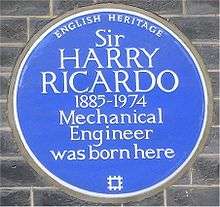 Harry Ricardo
Harry Ricardo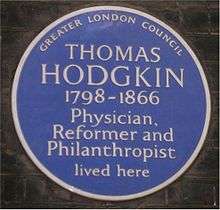 Thomas Hodgkin
Thomas Hodgkin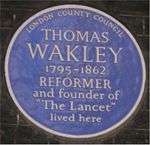 Thomas Wakley
Thomas Wakley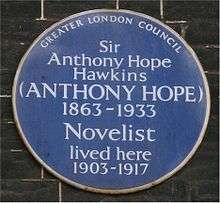 Anthony Hope Hawkins
Anthony Hope Hawkins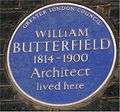 William Butterfield
William Butterfield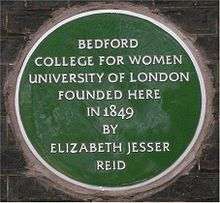 Elizabeth Jesser Reid
Elizabeth Jesser Reid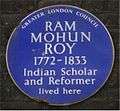 Ram Mohan Roy
Ram Mohan Roy Lord Eldon
Lord Eldon
Coordinates: 51°31′08.08″N 00°07′48.39″W / 51.5189111°N 0.1301083°W
- Plaquemap.com London blue plaque scheme — For exact location of these plaques within the square.